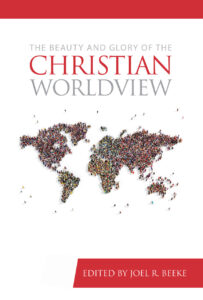
The universal scope of God’s sovereignty teaches us that we must glorify Him with all of our being. There is no “must” to enjoying God; it is but the consequence of glorifying Him. Do the one, and you will have the other. The Puritans fervently practiced this conviction in seeking to bring all of life under the direction of God’s Word. They believed in the great conclusion of Ecclesiastes 12:13: “Fear God, and keep his commandments: for this is the whole duty of man.” John Bunyan (1628–1688) said that fearing God “sanctifies the whole duty of man.”1John Bunyan, Treatise on the Fear of God, in The Works of John Bunyan, ed. George Offor, 3 vols. (1854; repr., Edinburgh: Banner of Truth, 1991), 1:491. He wrote, “It is a universal grace; it will stir up the soul unto all good duties. It is a fruitful grace, from which…flows abundance of excellent virtues, nor without it can there be anything good, or done well that is done.”2Bunyan, Treatise on the Fear of God, in Works, 1:465.
To be lived out, a worldview must be practical, and that requires wisdom. The Reformation doctrine of justification by faith alone released Christians from an unbiblical system of sacramental salvation and church-mandated penance. After the Reformation, the human tendency to drift into formalism and inconsistency of doctrine and practice became commonplace. The Puritans revived Reformation doctrine and made it more practical by stressing how to live the Christian life in every possible facet. Authors such as Richard Greenham (c. 1542–1594), Richard Rogers (1550–1618), William Perkins (1558–1602), William Ames, and Richard Baxter (1615– 1691) wrote treatises addressing various “cases of conscience” to guide believers on how to fear the Lord and do His will in every sphere of human existence.3See A Puritan Theology, 927–45.
Since so much is available today on Puritan views of personal godliness, family piety, and church reformation, we will touch briefly on these topics before immersing ourselves in the Puritan views of economics and politics.
Godly Personal Life
Ultimately, each of us will stand before the Lord to be judged for our own thoughts, words, and actions in life (2 Cor. 5:10). Therefore, the Puritans placed great emphasis upon personal godliness. The most important “case of conscience” they addressed was, “Am I a true child of God?”4See Joel R. Beeke, The Quest for Full Assurance: The Legacy of Calvin and His Successors (Edinburgh: Banner of Truth, 1999). The Puritans relished full assurance of salvation and peace with God through the blood of Christ, for both afforded the believer the stability and power to serve God. Knowing God as a loving Father through Jesus Christ helped a believer live for God’s pleasure by the Holy Spirit as directed through the written Word.
The Puritans believed that all of life should be offered to God as a continual act of consecration in response to His mercies (Rom. 12:1). Henry Scudder (c. 1585–1652) titled his devotional manual, The Christian’s Daily Walk in Holy Security and Peace, which John Owen judged to be written with “weight and wisdom in the directions given in it for practice… breathing of a spirit of holiness, zeal, humility, and the fear of the Lord.”5John Owen, Recommendation, in Henry Scudder, The Christian’s Daily Walk in Holy Security and Peace (Harrisonburg, Va.: Sprinkle, 1984), 9. Owen’s words summarize the Puritan view of personal godliness lived by faith in Jesus Christ.
Godly Domestic Life
The Puritans taught that the family is a divine institution; God is the Lord of the home and of all the relationships found in it. They stressed piety as family piety, for they saw the household as the first and fundamental unit of all human society.6The family is “the very first society that by the direction and providence of God, is produced among the children of men.” Cotton Mather, Family Religion Urged (Boston, 1709), 1, cited in Edmund S. Morgan, The Puritan Family: Religion and Domestic Relations in Seventeenth-Century New England (New York: Harper and Row, 1966), 133. William Gouge (1575–1653) wrote that “a family is a little church and a little nation,” and “a school where the first principles” of society are learned and practiced.7William Gouge, Building a Godly Home, Volume 1, A Holy Vision for Family Life, ed. Scott Brown and Joel R. Beeke (Grand Rapids: Reformation Heritage Books, 2013), 20. As a “little church,” the family was the setting of primary religious nurture, and so the Puritans strongly advocated family worship and instruction from a catechism based on the Bible. The Westminster divines intended that their work not only direct pastors and churches, but also that fathers and mothers use the catechisms and confession in the regular instruction of their children, so that they might say with Joshua, “As for me and my house, we will serve the LORD” (Josh. 24:15).8See the Epistle to the Reader in Westminster Confession of Faith (Glasgow: Free Presbyterian Publications, 1994), 5–12.
The Puritans wrote dozens of treatises about family life, describing the proper roles and relationships between husbands and wives, fathers, mothers, and children.9Henry Smith, A Preparative to Marriage, in The Works of Henry Smith (repr., Staffordshire: Tentmaker Publications, 2002), 1:5–40; William Whately, A Bride-Bush or A Wedding Sermon (1617; repr., Norwood, N.J.: Walter J. Johnson, 1975); A Care-Cloth: Or, the Cumbers and Troubles of Marriage (1624; repr., Norwood, N.J.: Walter J. Johnson, 1975); Arthur Hildersham, Dealing with Sin in Our Children, ed. Don Kistler (Morgan, Pa.: Soli Deo Gloria, 2004); Richard Stock, A Commentary Upon the Prophecy of Malachi, 168–91. In Richard Stock and Samuel Torshell on Malachi and Richard Bernard and Thomas Fuller on Ruth (1865; repr., Stoke-on-Trent: Tentmaker, 2006); Paul Bayne, An Entire Commentary upon the Whole Epistle of St. Paul to the Ephesians (1866; repr., Stoke-on-Trent: Tentmaker, 2001), 337–64; Daniel Rogers, Matrimonial Honor (1642; repr., Warrenton, Virginia: Edification Press, 2010); Ames, Conscience with the Power and Cases Thereof, 5.21–22, 35–38 (156–59, 196–211); John Davenant, Colossians, trans. by Josiah Allport, A Geneva Series Commentary (1831; repr., Edinburgh: Banner of Truth, 2005), 2:151–95; Nicholas Byfield, An Exposition Upon the Epistle to the Colossians (1866; repr., Stoke-on-Trent: Tentmaker, 2007), 346–61; William Gouge, Of Domestical Duties, ed. Greg Fox (1622; repr., Pensacola: Puritan Reprints, 2006); modernized by Brown and Beeke as Building a Godly Home (3 vols.); James Durham, A Practical Exposition of the Ten Commandments, ed. Christopher Coldwell (Dallas, Tex.: Naphtali Press, 2002), 221–36; Lewis Stuckley, A Gospel Glass: Representing the Miscarriages of Professors, Both in Their Personal and Relative Capacities (1852; repr., Grand Rapids: Ebenezer Publications, 2002), 169–83; Edward Lawrence, Parent’s Concerns for Their Unsaved Children, ed. Don Kistler (Morgan, Pa.: Soli Deo Gloria, 2003); Baxter, A Christian Directory, 2.1–22 (1:394– 493); excerpted and published separately as The Godly Home, ed. Randall J. Pederson (Wheaton, Ill.: Crossway Books, 2010); George Hamond, The Case for Family Worship, ed. Don Kistler (Orlando: Soli Deo Gloria, 2005); Swinnock, The Christian Man’s Calling, in Works, 1:464–528; Richard Adams, “What are the Duties of Parents and Children; and How Are They to Be Managed According to Scripture?” in Puritan Sermons, 2:303–358; Thomas Doolittle, “How May the Duty of Daily Family Prayer Be Best Managed for the Spiritual Benefit of Every One in the Family?” in Puritan Sermons, 2:194–272; Richard Steele, “What Are the Duties of Husbands and Wives towards Each Other?” in Puritan Sermons, 2:272–303; D. B., An Antidote Against Discord Between Man and Wife (1685; repr., Warrenton, Virginia: Edification Press, 2013); Matthew Henry, Family Religion: Principles for Raising a Godly Family (Ross-shire, Scotland: Christian Focus Publications, 2008); Cotton Mather, A Family Well-ordered: Or, An Essay to Render Parents and Children Happy in One Another, ed. Don Kistler (Morgan, Pa.: Soli Deo Gloria, 2001); Thomas Halyburton, “The Christian’s Duty, with Respect to Both Personal and Family Religion,” in The Great Concern of Salvation, in The Works of Thomas Halyburton (Aberdeen: James Begg Society, 2000–2003), 2:368–403. They placed every family relationship in the light of God’s sovereignty and fatherhood, and called every family member to live in the faith and fear of the Lord. Part of their genius was teaching people to stop looking at what others were doing, and to focus upon what they must do as their loving duty to God. Christ, of course, is the model in this; for what would become of us if Christ treated us the way we treat Him? God’s sovereign love is freely given, and so should ours be.
Godly Ecclesiastical Life
The Puritans varied in their understanding of church polity; some were Episcopalians, some were Congregationalists, and most were Presbyterians. Church government is an important biblical doctrine, but differences on this matter should not obscure the common ground shared by the Puritans in their high ideals concerning pastoral ministry and passionate activism to promote godliness among the people of the church. Packer has argued that “Puritanism was, at its heart, a movement of spiritual revival” in the church, though they did not use the word revival so much as reformation.10Packer, A Quest for Godliness, 37–38. They understood that revival is the work of the Spirit, while reformation is also our response to the Word of God.
The Puritans also believed that reformation and revival took place as the Holy Spirit applied the preached word of God. Therefore, they instituted a program for biblical preaching:
- by preaching in a biblical, doctrinal, experiential, and practical manner;
- by establishing lectureships (privately funded preaching ministries) to bring the ministry of the word to parishes lacking a Reformed, experiential pastor;
- by organizing “prophesyings” or conferences where ministers met to hear sermons and discuss good preaching methods while other people listened;
- by publishing their sermons as tracts and books, producing literature full of doctrine and “uses,” or applications for all aspects of life; and
- by training preachers at the universities in Cambridge and Oxford to evangelize unreached communities and carry on the ministry in future generations.11See Joel R. Beeke, “Puritan Preaching (2),” in A Puritan Theology, 699–705.
The Puritan approach to revival and reformation reflects their worldview of the supremacy of God above all human authorities. As Perkins said, the faithful preacher is “the voice of God,” for he speaks in the name of Christ (2 Cor. 5:19; 2 Thess. 2:13–14), and the Spirit of God speaks through him (1 Cor. 2:4).12William Perkins, The Arte of Prophecying, trans. Thomas Tuke (London: by Felix Kyngston for E. E., 1607), 3, 133. Since the church is one family with one head under one Father, His Word must prevail in all its beliefs, decisions, and activities.
Read: A Worldview Illuminated by God’s Sovereignty
Excerpt From
The Beauty and Glory of the Christian Worldview
Joel R. Beeke and Paul M. Smalley









